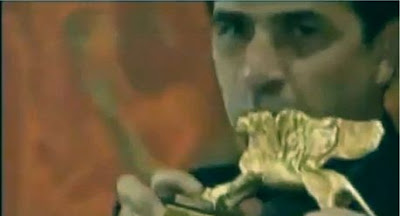Monday, January 17, 2011
Political Prisoner: Film Director Jafar Panahi

On December 20th 2010, outstanding and award winning Iranian film maker, Jafar Panahi, was sentenced by the Islamic Republic Revolutionary Court to six years imprisonment and twenty years ban from film making, writing, giving interviews and traveling abroad. Prior to the sentence, in July of 2009, Jafar Panahi had been arrested along with mourners at the grave site of Neda Agha Soltan, a martyr of the crushed post election uprising. Panahi was released after the confiscation of his passport, but later rearrested at his home in March of 2010 and taken to Evin prison along with his wife and daughter. His family members were released two days later but Panahi was kept in appalling conditions, mistreated and psychologically tortured. Subsequently on May 18th 2010 Panahi went on a hunger strike, forcing Evin prison officials to release him on (US)$200,000 bail one week after the start of his hunger strike.
Today Jafar Panahi, one of Iran's best film makers, is locked behind the doors of one of Islamic Republic's most notorious prisons and torture factories. An artist whose talents were recognized at an age of ten years old. Awarded at international film festivals such as Cannes Film Festival, Locarno Film Festival, Venice Film Festival and Berlin Film Festival. Today Jafar Panahi is forced into silence, caged and treated as a criminal for simply thinking differently than the governing Islamic establishment. His only crime was to have openly mourned the death of one of the scores of martyrs of the 2009 Islamic Republic elections. It is noteworthy to mention that on the same date Panahi was sentenced another film maker by the name of Mohammad Rasoulof was also sentenced to six years imprisonment for assembly, collusion, and propagandizing against the regime.
In the early days of the Islamic revolution, persecution of artists, actors, musicians and authors were common place, the revolutionary regime was so audacious that summons in the form of long lists were printed in daily newspapers. It has become known today, several of Iran's best artists were raped in custody. The regime was beginning a Stalinist purge of the artistic community by completely stopping every mode of expression and communication. Later the Islamic intelligence ministry (VEVAK) began its involvement in the production of films. Its film office at Ministry of Culture and Guidance regulated all aspects of arts and kept an eye on every artist. The intelligence ministry became highly involved in the writing and editing of film scripts for domestic consumption. At the same time it opened the hands of certain few film makers to produce films solely suited to the international market, to export an image of the Islamic republic as a haven for free artistic expression, when domestic films were infested with poisonous undertones, disseminating the ideology of a sickly apparatus, trying to brainwash a new generation through their perceived control of artistic expression and media.
It is a fact today that Islamic republic has failed in its war against artistic expression and control of media. Evidenced by massive dissent at every generation, desire for freedom is much stronger than the control any government can muster.
Labels: Agha Soltan, Art, Berlin Film Festival, Cannes Film Festival, Evin, Film, Jafar Panahi, Kiarostami, Locarno Film Festival, Movie, Neda, Prison, Rasoulof, Venice Film Festival, VEVAK
Comments:
<< Home
Thank you for posting the information about Jafar Panahi. That seems worth breaking a six-month blog silence! I hope there will be more posts about what is going on in Iran.
Post a Comment
<< Home



